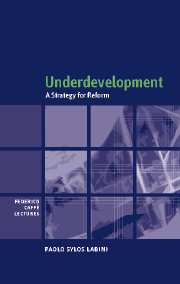Book contents
- Frontmatter
- Contents
- List of figures and tables
- Introduction
- 1 Economic development in a secular perspective
- 2 Culture, institutions and resources
- 3 The inadequacy of mainstream economics to explain development processes: returns and prices
- 4 The inadequacy of mainstream economics to explain development processes: distribution and growth
- 5 Economic relations between developed and underdeveloped countries
- 6 Demographic pressure and the countries of increasing poverty
- 7 Dependent workers, employment and unemployment
- 8 Organizational and institutional innovations
- 9 The problem of corruption
- Conclusion: a strategy for reform
- Bibliography
- Index
1 - Economic development in a secular perspective
Published online by Cambridge University Press: 22 September 2009
- Frontmatter
- Contents
- List of figures and tables
- Introduction
- 1 Economic development in a secular perspective
- 2 Culture, institutions and resources
- 3 The inadequacy of mainstream economics to explain development processes: returns and prices
- 4 The inadequacy of mainstream economics to explain development processes: distribution and growth
- 5 Economic relations between developed and underdeveloped countries
- 6 Demographic pressure and the countries of increasing poverty
- 7 Dependent workers, employment and unemployment
- 8 Organizational and institutional innovations
- 9 The problem of corruption
- Conclusion: a strategy for reform
- Bibliography
- Index
Summary
The long preparation
Economic development has become a systematic process only in the last 500 years; it has become systematic and vigorous only in the last 200 years, with the development of modern industry.
The development process started in certain European countries and only later in other continents. Previously expansions of production were occurring irregularly and in limited areas, sometimes linked to migrations or wars. Technological and organizational innovations took place very irregularly. Organizational innovations took the form of new systems of legal rules applying to the behaviour of the members of a given society in their life and in their economic activities. Greece excelled in the creation of new systems of thought, that subsequently became the matrixes of modern science. Rome excelled in the creation of new rules of behaviour and new institutions, that proved to be so vital that, even after the extraordinary changes that have occurred in social and economic life in the course of centuries, they still survive to a non-negligible extent in contemporary societies – property laws, credit and debt relations, the system of contracts, laws about commerce and the organization of productive units, for example.
Technological changes applied to production became less and less rare in the last 400–500 years, hand in hand with the development of experimental science. Indeed, the relations between science and economic activity began to become systematic, starting with the epoch of the great geographic discoveries.
- Type
- Chapter
- Information
- UnderdevelopmentA Strategy for Reform, pp. 17 - 32Publisher: Cambridge University PressPrint publication year: 2001



